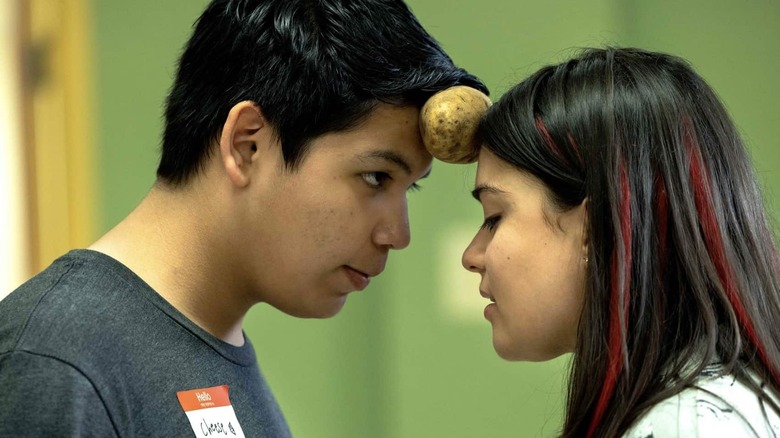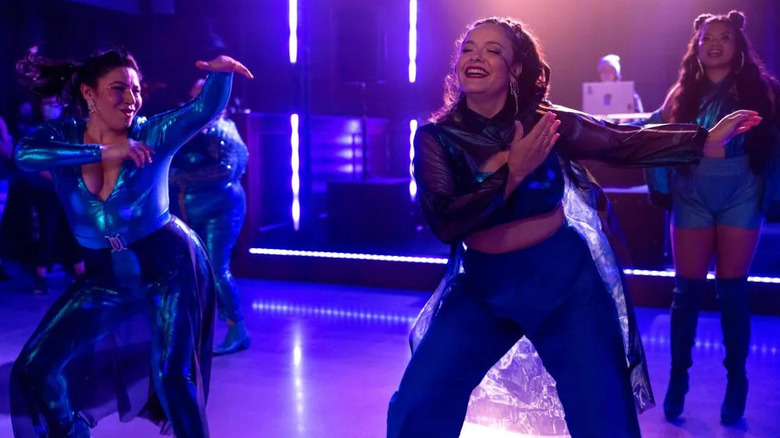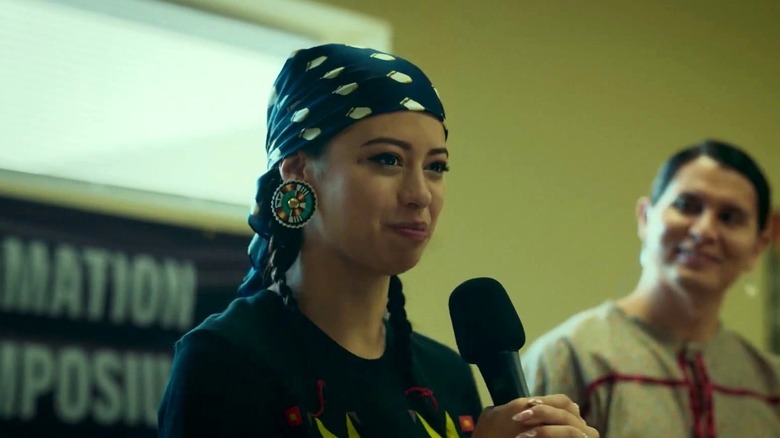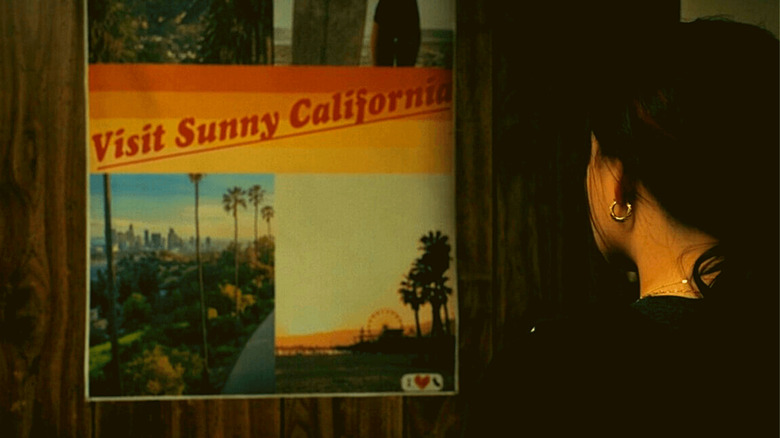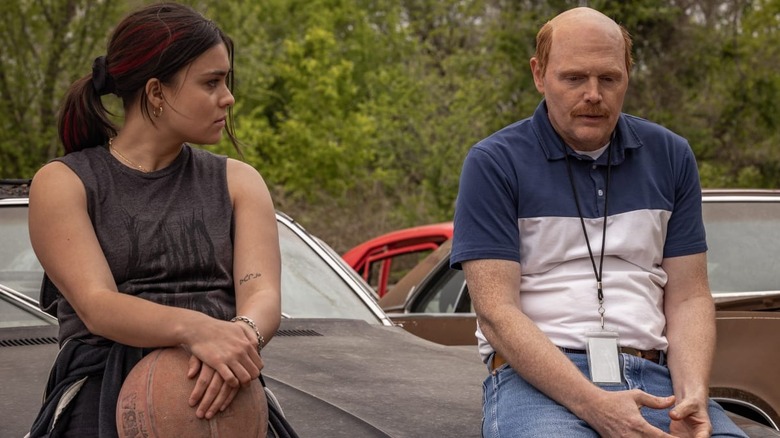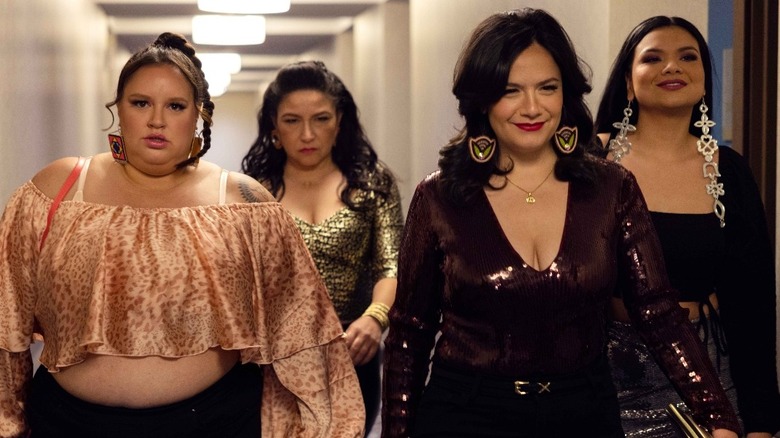Reservation Dogs Writer/Director Tazbah Chavez On Trust, Homages, And That Choreographed Dance [Exclusive Interview]
Tazbah Chavez is one of the voices behind "Reservation Dogs." The writer, executive producer, and director first met the show's creator, Sterlin Harjo, when she was a teenager attending film festivals. Harjo was one of the many artists, including Taika Waititi, who responded to Chavez's writing. Almost a decade later, they're all now working together on the acclaimed FX show.
Presently, Chavez is in the writers' room for the next chapter in the series. For season 2, she directed "Decolonativization" and "Wide Net." Outside of "Reservation Dogs," Chavez directed "Your Name Isn't English" and wrote for "Resident Alien" and "Rutherford Falls." She is a a poet, as well, with a knack for atmosphere and feeling she always tries to bring to "Reservation Dogs." During a recent Zoom call, the artist talked us through writing and directing on the series, as well as what to expect from "Reservation Dogs" season 3.
'The most important thing is that these women come off like they just feel bad***'
You were 16 and already attending film festivals with a short film, right?
Yeah. Well, it's interesting because you do all these generals around town, and people always ask you, "What's your journey? How did you get here? When did you know you wanted to be a writer?" It's always weird for me to answer because I don't have an elevator speech because I feel my trajectory started a long time ago, and it had all of these loops and curves. I think if someone were to meet me now, they'd be like, "Oh, well, you've been writing TV for three and a half years. That's so fast." I'm like, "Yes, that is true, but I have been involved in film since I was very young, and I've known people like Sterlin since 2008." I've known him, I've known Taika, I've known all these people since I was so young. And I've known Bird Runningwater, who is sort of the person that helped usher people like Taika and Blackhorse [Lowe] in, through Sundance. I've known those guys since I was 16. And then, I was a poet, and I was making stuff for other people all the time. One time, somebody was like, "When did you decide you wanted to be a TV writer?" I was like, "Well, I didn't decide. I didn't even know that was an option."
When people say, "It happened so fast," you could always say, "Well, I've been writing since the third grade."
Yeah, it wasn't that fast. I think one thing that has helped is there's something I don't know, and I'm always eager to learn it. I'm constantly filling in gaps, and I'm constantly taking a class, I'm constantly reading a book. I'm constantly trying to figure out if there's an area that I don't feel good in or I lack in; I'm not going to sit around and be like, "Oh, well. I just suck at that thing." No, I want to figure out how to get good at it.
What were those moments in season 2 of "Reservation Dogs?"
Everything that I've been able to direct for TV so far, there's always something in every episode that I don't know how to do or I've never done before. I think I've done eight episodes now, not just with "Res Dogs,” but other shows. Each time I get a script, there's something in there where I'm like, "I've never directed, like, sex scenes before. That's new." Or I did this show "Accused," and there's someone getting shot, and there's the FBI coming, and I'm like, "I've also never done that." With "Res Dogs" this last year, in each episode there was something. One of the things I had never done, and I think what was exciting for "Res Dogs” in episode 5, "Wide Net," was a choreographed dance sequence before.
How was that experience?
I actually grew up dancing. I was a competitive dancer for all of middle school and high school. My cousins and I used to dance like that in the backyard. That opening scene is a direct homage to my cousins and I on the res. When it came to having choreography, it's like, "Okay, we need to find a choreographer." Even though he did the choreography, I still went and I learned it when we had stand-ins who learned it first. We needed to test this out. The four lead actresses in that episode all come from dance or theater backgrounds, so they also have this skill set.
We picked four stand-ins who were not dancers for the choreographer to teach first to figure out, "What I am actually asking the actors to do over and over again?" I went and I learned it with them because I grew up dancing, but I hadn't danced like that in years. I wanted to make sure I wasn't asking for something that was completely unrealistic because that show shoots so fast. We get four days for ten-hour days, and it's quick. You don't have a lot of time.
It also means scheduling in rehearsals for the actors. And so, that was a cool process of how we best prepare them, and how we best make sure that what we're asking them to do is feasible and comfortable and confident. Because, to me, the most important thing is that these women come off like they just feel bad***. If I'm going to have them do something where it's not, then it's pointless.
One of the things that was cool about it is that because of my dance background, when I went to finally watch Jana [Schmieding], Sarah [Podemski], Tamara [Podemski], and Nathalie [Standingcloud] do it, there was ways where my brain was like, "Okay, could we have their formation go like this?" or, "Instead of this move, can it go like this?" And then, of course, you put them on the floor and you're like, "What are all the ways that we can shoot this?"
'I am excited when I don't know how to do something'
You usually work with the same cinematographer on "Reservation Dogs," right?
"Res Dogs" is fun because we've had the same DP for both seasons, and I love Mark [Schwartzbard]. Mark is such a good partner because I feel comfortable going to him and being like, "Mark, I've never done this before. Tell me what is the best way to approach this or what are some ways." He's amazing at never making anyone feel they're dumb or they can't do something. He's down to try anything.
The youth conference episode, which is episode 6, I said to Mark, "I want to do these things for this potato dance, and there's never been a potato dance on TV, and these conversations need to happen." So in both episodes there were definitely things that I hadn't done before. Like I said, I am excited when I don't know how to do something. I think it's important to be able to admit that. Going in and acting like you do know how to do something, if you're going to feign confidence or an ability that's not real, that's going to crumble real fast.
I think Christopher Nolan is known for that, too — being comfortable enough to just say, "I don't know." Trust the people you work with, right?
Totally. I think, for me, I know what the end in mind is. That's clear to me. As long as I know what the North Star is and what Point B is, I know we'll get there. I don't think any of us have it 100% figured out for every single little detail. That's what you have a whole crew for. That's why I love TV and filmmaking, because it's a team sport. So many people are involved in the end product, and I always feel funny taking any kind of credit for it because it's so many departments, and so many creative people, and so many artists are offering their creativity to you. It is the best job in the world, but it's a team sport, in my opinion.
The team behind the show is a variety of artists, too. Sterlin does comedy, you're a performance poet, and the list goes on. In the writers' room, how do you think those different influences beyond television shape the show's vision?
I think Sterlin has a quote out there like, "We don't do anything that feels too TV." It's true. Sometimes we'll be pitching stories and we'll be like, "But that feels like what you do in TV, so let's not do that." It's not a defiance to it. It's natural, and it is that he leads from such good instinct.
I do think that you have this room put together of people from various lived experiences, various skill sets. There are four people I would consider poets in that room. There's myself, there's Tommy Pico, Bobby Wilson, who's a multi-hyphenate and good at everything. And then, Ryan RedCorn, who we see in [the comedy sketch group] The 1491s, but is actually an incredible poet as well. And then you have people like Blackhorse and Sterlin. They know so much about film and cinema and references, and they can literally just spit out anything, which is incredible. And then we have Devery [Jacobs] in there, who comes from an acting background, and who is an incredible director and writer. And we have Erica [Tremblay], who had a completely different life.
I actually worked in beauty care for 12 years before I did this. I had a job that was teaching product knowledge, customer service, business acumen, presentation facilitation skills, and leadership development. You even take those skills and you put them into a space. Those skills are still applicable into the creative process, especially when you're trying to get a team moving in one direction. Every single writer in that room comes from such a unique place. I mean you have Chad Charlie, who is a writer and director, and also is still a roofer. You'll still see him building houses on his Instagram. That's what he's doing when we're not in the room.
We do come from a place where we're not shy to lean into, I think, the poetry and in the way that we move through life. I think that poetry is a very applicable medium to film. To me, it's the visual aspect of it. Less so in the writing. I used to think that you'd apply poetry to dialogue or scene description. For me, it doesn't show up there. It actually shows up in the choices that we make in camera movement, and shot, and pace, and all of those things.
'They might not let us do this again, so let's go for it, and let's tell the story that we know'
How do you approach the camerawork like poetry?
They're rooted in the same thing, which is feeling and which is humanity. The way that I do poetry is I've always done it with music. At the end of the day, I'm a poet first and foremost, and a performance poet. I've always mixed it with music. And so, I think when I apply that to directing or to writing, it still comes from the same place. The thing that I feel I can confidently do is make people feel things. You can accomplish that on the directing side and just tapping into these things inside of human beings and messing with the switchboards.
I work with the producer who makes that music, so it's not just by myself. We sit together and we make alterations to it. It's the same thing as editing. It's the same thing as collaborating with a DP like Mark. It's like, "How do we tap into how people feel things?" While I might not be great at everything, I do know for sure I can make people cry, I can make people laugh, and I can make people care. I wish there was a way to describe how I'm doing that. I just know that when I'm directing it, I feel it in the same place in my body that I feel when I'm performing poetry.
Was writing and directing for season 2 any different compared to season 1?
Well, season 1, there were six of us in that room that wrote season 1, and we were just excited to be able to make something. We were like, "Well, we'll probably never get to be able to do this again, so let's just tell the stories we know." It's so rare that anyone has ever paid Native people for this, honestly, the first time anyone's paid an all-Native writers' room to exist. And so, we were like, "Well, they might not let us do this again, so let's go for it, and let's tell the story that we know."
Season 1, it was very, very organic. We kind of had nothing to lose. I think, though, season 2, we didn't realize what the reception would be for season 1. It was this wonderful feeling of, "Oh, my God. People like us — as in us, as in Native People, and you like our humor, and you think that we're funny, and you're participating in our joy, and you're on the inside of the joke." Often, it's our pain people are associating with or the trauma or the way that Native People have been portrayed so long by non-Native creators. It felt so good that people liked us for the laughter, and the humor, and also the heartache, because I think that this show has so much of that in here.
Season 2, I think, got funnier. I think it got weirder. I think it was better. I think the storytelling, we really hit a nice stride. Season 1's reception gave us a confidence boost to take it even further to say, "Okay, y'all thought you liked season 1? We haven't even gotten started yet." Season 1 was scratching the surface. Season 2, we're like, "Well, let's go deep. Let's do some weird stuff. Let's do a dance routine."
We expanded the writers' room. I think we doubled the size, still kept it all Indigenous. Anytime that you add new voices into a room, you're going to get cool stories and perspectives. And so, I also credit season 2 to the new writers that we added and their voices coming in. We have such tribal diversity in the room. Not many of us are from the same tribe or from the same regions. So I think anytime you do that, you get a really full representation. We can't represent all 600 tribes, but right now we're doing like eleven. So, that's pretty good.
'We're at a place in season 3 where there's a lot of freedom now'
Now you're writing for season 3. After season 2 and its reception, where's the show going now?
I can't speak for Sterlin, but for me, we're at a place in season 3 where there's a lot of freedom now. People know the characters now, they're invested in the characters. We've been able to build them out more. And so, in season 3, that allows us freedom to go wherever. I think people will go with us there. I think that it gives an opportunity to tell origin stories of other characters, where maybe we haven't been able to get as deep into them. I don't think it would throw everybody off.
I don't think they'd be like, "Why is this one-off episode about so-and-so?" I think we created enough curiosity around so many cool characters that we're at a place now that we could have a random episode about a character that wouldn't feel out of the blue. Also, I think we found this nice lane of being able to say things without having to say them overtly. I think that's a nice place to be in storytelling.
For example, in season 2?
I think that in season 2 we hit on a lot of things. With episode 7, "Stay Gold Cheesy Boy," we hit on the foster care system, and we're hinting at the Indian Child Welfare Act, which affects a lot of Native folks. It's not like we go into these things like, "We want to say this thing about this issue." It's just that in telling our stories as they naturally exist in our communities, there are a lot of social issues that our community is faced with very heavily in ways that I don't think people consider.
For example, in episode 9, with Willie Jack (Paulina Alexis) going to visit her auntie and touching on the subject of Native Women in incarceration, we have one of the highest incarceration rates as Native People in the country. It's not something that's looked at. And we're not going to be like, "Well, you know what? This episode, we want to talk about how." It's not that. We go in telling the stories of people we actually know, and on the other end we're like, "Oh, yeah."
Right. It's inherently there. Are a lot of film references still discussed in the writers' room?
There are so many. Every day we leave the room and there's a list of movies we should try to watch before the next day. Sterlin, his brain and ability to hang onto every movie he's ever watched is unparalleled. Sometimes I could be stuck in my own writing and ask, "Hey, do you have a movie I could watch that might make me feel like this?" He'll text back in two minutes, and be like, "You should watch this and this."
Those references are really driven by him. He loves to pay homage, which I love. Also, a lot of us were raised in an era where we were going home by ourselves with the house key and putting on movies and TV. A lot of us grew up not knowing that we'd be working in this kind of work in the future, but a lot of us were raised by film and TV without really knowing it, you know?
Almost like an unintentional film school.
Yeah, yeah. Well, it's funny because people ask me like, "Okay, what are the things that you watch when it comes to TV?" My film education is "X-Files," "The Simpsons," "Cops," "I Dream of Jeannie," and soap operas with my grandma. Sometimes I think I should lie and be like, "Oh, it was something very deep." Honestly, I was the youngest of four children and my dad was just trying to get us bathed, and he was like, "Put this on." By the time bath time was over, "X-Files" or "The Simpsons" was on.
''You know what? Let's see what happens'
What's a movie Sterlin has recently texted you to watch?
Oh, my gosh. So many. I think one that he had us watch for the use of a voiceover was "Days of Heaven." Oh, and in my episode "Wide Net," there's a "Reservoir Dogs" reference of them walking down the hall. It's playing homage to the slow motion of them coming forward. I think every single episode has something that's paying homage to it. Intentional. None of them are like, "Whoops!" Sterlin loves "The Outsiders" and "The Lost Boys," so those things come back continuously.
As you said, the show avoids anything that feels too overtly like TV, but are there any rules for the show, especially with the camerawork?
We do a lot of handhelds — that's encouraged. We do study the pilot and we do study Sterlin's episodes to make sure we're the same visual language which, of course, Mark and his team help us keep that consistent. Sterlin has always said, there's the one thing in that episode that's your marker, your thing. If you look at Blackhorse's episodes, Blackhorse is great at movement. Other than that, most of us that direct on the show work on the show, so it's not the same as going into a different television show where there are rules, where it's like, "We only shoot in wides. We stay out of singles. We reserve movement for specific things." That's not really here.
We do what best serves the story. To me, it ends up coming out as these little mini-movies, which is cool. I also don't know if I'm so ingrained in it that I just don't realize that we do. We go with our gut. There hasn't really been anything where Sterlin's been like, "Hey, we don't do that." Other projects, for sure, will be like, "Oh, we don't do handheld." That's just the nature of the show, and that's totally fine.
I would like to say we're strategic about things, but I think part of what makes this show amazing is it's very organic, and there's a lot of creative freedom for writers. There's a lot of creative freedom for directors. There's a lot of freedom for actors. It's not a very micromanaged or controlled creative space, which I think is what makes it magic. People really are able to bring to the table what they offer.
I give credit to Sterlin for honing the space and creating a culture around the show that allows artists and people to shine, and that means putting trust in them and allowing them to carry out the vision that they had. I mean, him and I had disagreements on the way the dancer team should have been. In the end, he was like, "No, go with your gut." I was like, "This is your show. I'll do what you want. I'm just here to deliver." He's like, "No, go with what you think." And later on he was like, "I'm glad that you went with your gut on that because it came out funnier for that. It came out better than what I envisioned."
I think that is huge about who he is as a showrunner and as a leader, is that even if it goes against something that he might think, he trusts his people enough to say, "You know what? Let's see what happens." Usually, you get better work when you let people do that.
"Reservation Dogs" season 2 is now available to stream on Hulu.
